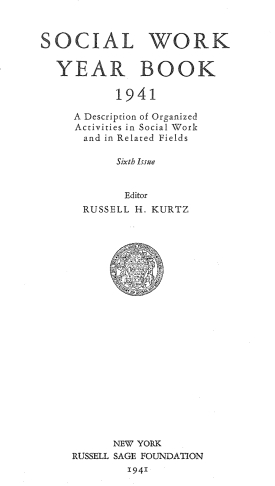Democratically-elected leaders are expected to make policy that reflects the interests of their constituents. In reality, however, money buys ads that frame the public debate, funds candidates who run for office, and pays lobbyists who advocate for specific legislation. Political scientist In Song Kim will examine campaign contributions and lobbying to investigate the political origins of social and economic inequalities. First, he will develop a comprehensive database of money in politics, encompassing all federal lobbying and campaign donations from 1999 to the present.

Social Work Year Book, 1941
About This Book
The sixth biennial issue of reports on the status of organized activities in social work and in related fields, including 83 signed articles prepared by authorities on the topics discussed as well as a directory of national and state agencies, both governmental and voluntary, related to social work.
Download
RSF Journal
View Book Series
Sign Up For Our Mailing List
Apply For Funding
There are nearly 90,000 local governments in the U.S., with hundreds of thousands of locally elected officials in city, county and other types of local governments. Some research finds that local governments are responsive to the views of their citizens across many policy areas and that citizens' preferences have large effects on policy outcomes. The literature also suggests that the affluent and homeowners are over-represented relative to the poor and racial minorities. However, scholars have little systematic knowledge about inequalities in participation and repre
Voters can be aggregated into a large, multi-member district, with each citizen voting for several candidates (‘at-large elections’), or disaggregated into several smaller, single-member districts, with each citizen voting for only one candidate (‘district elections’). How voters are aggregated not only affects who legislators are accountable to, but also which coalitions achieve representation. Political scientists Michael Hankinson and Asya Magazinnik will use the permitting of new housing to measure the effects of voter aggregation on policy.
Political scientists Brendan Nyhan and Andrew Guess and computer scientist Christo Wilson will analyze the extent to which selective exposure online is the result of algorithms versus human behavior. They propose to test four hypotheses. First, that personalization algorithms significantly change recommended content and search results on online platforms. Second, that observed differences in search results due to these algorithms will be correlated with demographic and attitudinal factors (such as ideology and party identification).
While immigration hearings are civil proceedings, they are commonly misunderstood as criminal. As a result, immigrants and asylees face harsh sanctions, such as detention, but are not entitled to an attorney if they cannot afford one. Nonprofit organizations attempt to help low-income immigrants but struggle with scarce resources. This raises the question: Does legal assistance to immigrants make a difference in the outcomes of their hearings?
Leveraging quasi-experimental designs, this project tests whether personal networks effectively structure the political opportunity of individuals. We theorize that the propensity of individuals to run for and attain office is shaped by who they know—and that, in extension, representational inequalities visible in US electoral institutions is driven by the prevalence of informal networks. To test our theory, we web scrape biographical information of individuals that ran for state assemblies during the period of 1996 - 2016.
In the 2018 midterm elections, concerns around health care—including pre-existing condition protections, prescription drug prices, women’s health care, and even single-payer health care proposals—were central to voter mobilization efforts. These issues played a prominent role in many House, Senate and gubernatorial races, and health care-related measures were on the ballot in several states.
Pagination
- Previous page
- Page 15
- Next page
